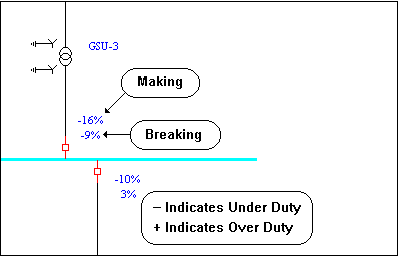 Equipment Duty in the ribbon. Fault any or all buses, and the results appear next to each underrated device.
Equipment Duty in the ribbon. Fault any or all buses, and the results appear next to each underrated device.SmartDuty™ is the world's first Expert System for the verification of breaker, switch, and fuse duties. SmartDuty™ applies the appropriate short circuit calculation to each device, then compares the calculated currents with the rated duties. Underrated devices and devices within a user-defined threshold are highlighted on the one-line showing the percentage overduty next to each device. Devices within tolerance are not highlighted.
SmartDuty™ calculates the maximum current through the line side and load side of each device for comparison. This eliminates the costly and time consuming problem of standard bus faults not properly accounting for branch contributions.
Note: The ability to automatically check equipment duties during analysis is only available if you have purchased the SmartDuty™ option to EasyPower.
To use SmartDuty™, click  Equipment Duty in the ribbon. Fault any or all buses, and the results appear next to each underrated device.
Equipment Duty in the ribbon. Fault any or all buses, and the results appear next to each underrated device.

Figure 1: SmartDuty™ One-line Results
High voltage breakers show two results. The top result is the making (momentary) duty, and the bottom is the breaking duty. A negative sign indicates that the fault current is less than the device rating. A positive number indicates that the device is over-dutied. Notice in the example that the top breaker is highlighted even though both duties are negative. This is because the interrupting duty (-9%) is within the user-defined threshold tolerance of 10 percent. Although the breaker is actually 9 percent under duty, a warning is still issued because the tolerance is set at 10 percent. The threshold tolerance provides a warning level indication. The tolerance value can be set in the Control tab of the Short Circuit Options dialog box.
|
HV Breakers |
Peak Making Capacity with Peak Current |
Breaking Capacity (ac symmetrical) with Equivalent Breaking AC current |
|
LV Breakers |
Breaking Capacity (ac symmetrical) with Equivalent Initial AC current |
|
|
Fuses |
Breaking Capacity (ac symmetrical) with Equivalent Initial AC current |
|
|
Switches |
Making Capacity (ac symmetrical) with Equivalent Initial AC current |
|
| IEC Short Circuit Reference | |
| Setting the Short Circuit Method | |
| IEC Short Circuit Options |